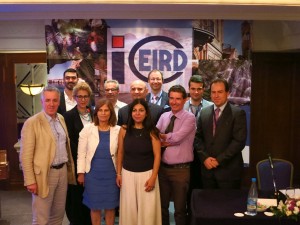Download here the transcript of the event:
THA Greece_Roundtable ICEIRD_Cyprus Transcript Report_EN_Final
THA Greece_Roundtable ICEIRD_Cyprus Transcript Report_GR_Final
Cyprus is undergoing significant reforms towards fighting the harsh effects of the economic crisis and especially of the severe economical situation from the past two years. In this context, following the global trend of boosting triple helix interactions for proper regional economic development in the knowledge based fast pacing economy, it is of critical importance to set a common roadmap for the triple helix stakeholders towards enabling co-creation. To this end, the THA Chapter of Greece has taken the initiative and organized a roundtable Discussion on Triple Helix Interaction together in the frame of the 7th International Conference for Entrepreneurship, Innovation and Regional development from 6th of June 2014 (Nicosia, Cyprus).
The roundtable discussion was formed of eight panellists from various sectors: Parisis Thomas (RTD Talos Ltd), Paraskeva Marilena (Cyprus Research Promotion Foundation) Martidou Despina (Forcier, Director of Higher and Tertiary Education, Ministry of Education and Culture), Peroulakis Georgios (Senior Desk Officer in EC-DG Regio), Vorley Tim (Senior Lecturer, The University of Sheffield, UK), Kofteros Stavriana A. (Deputy Press Spokesperson Democratic Rally), Dikaiakos Marios D. (Professor, Department of Computer Science, University of Cyprus), Georgiou George (Associate Professor, Dept. of Electrical and Com. Eng., University of Cyprus). The discussion was moderated by Prof Ketikidis Panayiotis (President of the Triple Helix Association Chapter of Greece).
The main outcome of this roundtable discussion is the fact that the entire triple helix ecosystem (university, industry, government) has to evolve and adapt together in order to properly achieve the co-creation stage by investing in excellence. The government should function as an enabler to give incentives for the involved stakeholders so that we can facilitate academic-business collaboration. Furthermore, there is a need to answer SME (98% of Cyprus’s businesses) problems but there is a lack of communication between academia and SMEs and there should be coaching provided for all departments on how to commercialize research and approach SMEs. Also, the general view of the panelists was that triple helix collaboration is a necessity for receiving funding by achieving a balance between basic research and industry funded research. Entrepreneurialism and creativity is important in each triple helix entity and the needs of SMEs must be carefully taken into consideration.
Good academics are necessary, good entrepreneurial academics are also necessary but often, this collaboration is diminished by bureaucracy and overall framework and mentality. Right channeling is needed for a good idea and for matching a business with academia. Overall, we need companies to crate this interaction between industry and academia. Cyprus does not have it. It is a small market, mostly SMEs, therefore we need to look outside of Cyprus. In any case, entrepreneurial courses (including intellectual property management) and the related commercialization skills are highly necessary. However, entrepreneurship cannot be thought, but the following can be taught: entrepreneurial skills and soft skills, critical thinking, how to discover opportunities. Students and academics should be encouraged rather than forced to adopt entrepreneurial attitude. People should be empowered to meet market needs and achieve excellence.

